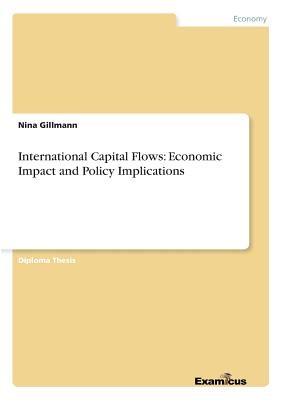
- We will send in 10–14 business days.
- Author: Nina Gillmann
- Publisher: Examicus Verlag
- ISBN-10: 3867463654
- ISBN-13: 9783867463652
- Format: 14.8 x 21 x 1.2 cm, minkšti viršeliai
- Language: English
- SAVE -10% with code: EXTRA
Reviews
Description
Diploma Thesis from the year 2000 in the subject Economics - Finance, grade: 1, Christian-Albrechts-University of Kiel, language: English, abstract: This paper deals with three highly controversial aspects in the international finance literature: the degree of international financial integration, the economic impact of capital mobility, and the potential role of capital controls in the emerging international financial architecture. Regarding the first aspect, many observers have been influenced by the recent hype about "globalisation" and in fact take it for granted that capital markets have become almost fully integrated into a world financial marketplace. This paper, reviews evidence that challenges this conventional wisdom, though confirming that the degree of international financial integration is rising. With respect to the second aspect, it is demonstrated that there are circumstances under which the free flow of international capital could negatively impact upon economic performance and/or otherwise welfare-enhancing domestic policies. This finding conflicts with traditional theory and provides an economic rationale for the judicious introduction of capital controls. With this assertion in mind, the final aspect, the role of capital controls, is investigated. The specific question explored is how far restrictions on international capital flows are able to avert a costly economic imbalance arising from fluctuations in the balance of payments. Although the international consensus seems to have shifted in recent years towards promoting Chilean-style capital controls as a potential new building block in the international financial landscape, this paper cautions against such a generalisation of the Chilean experience. Rather, a review of the empirical literature suggests that much of Chile's economic success story in the last decade can be explained by factors other than its control regime. The rising degree of international financial integration enhances the need
EXTRA 10 % discount with code: EXTRA
The promotion ends in 22d.10:59:44
The discount code is valid when purchasing from 10 €. Discounts do not stack.
- Author: Nina Gillmann
- Publisher: Examicus Verlag
- ISBN-10: 3867463654
- ISBN-13: 9783867463652
- Format: 14.8 x 21 x 1.2 cm, minkšti viršeliai
- Language: English English
Diploma Thesis from the year 2000 in the subject Economics - Finance, grade: 1, Christian-Albrechts-University of Kiel, language: English, abstract: This paper deals with three highly controversial aspects in the international finance literature: the degree of international financial integration, the economic impact of capital mobility, and the potential role of capital controls in the emerging international financial architecture. Regarding the first aspect, many observers have been influenced by the recent hype about "globalisation" and in fact take it for granted that capital markets have become almost fully integrated into a world financial marketplace. This paper, reviews evidence that challenges this conventional wisdom, though confirming that the degree of international financial integration is rising. With respect to the second aspect, it is demonstrated that there are circumstances under which the free flow of international capital could negatively impact upon economic performance and/or otherwise welfare-enhancing domestic policies. This finding conflicts with traditional theory and provides an economic rationale for the judicious introduction of capital controls. With this assertion in mind, the final aspect, the role of capital controls, is investigated. The specific question explored is how far restrictions on international capital flows are able to avert a costly economic imbalance arising from fluctuations in the balance of payments. Although the international consensus seems to have shifted in recent years towards promoting Chilean-style capital controls as a potential new building block in the international financial landscape, this paper cautions against such a generalisation of the Chilean experience. Rather, a review of the empirical literature suggests that much of Chile's economic success story in the last decade can be explained by factors other than its control regime. The rising degree of international financial integration enhances the need


Reviews